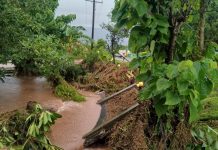
FLOODED homes, grieving families, submerged streets — these are not the outcomes anyone expects from a public infrastructure program. Yet these grim realities unfolded after a series of Department of Public Works and Highways (DPWH) projects in Iloilo City allegedly blocked natural waterways and triggered severe flooding in at least 68 barangays. A young life was lost, and countless others were disrupted. What makes the situation worse is not just the tragedy — but the fact that it could have been prevented.
Mayor Raisa Treñas’ issuance of a cease-and-desist order against ongoing DPWH projects, which included so-called slope protection and bike lane works that allegedly encroached on creeks and drainage channels, is a much-needed assertion of local authority. It also exposes a glaring flaw in infrastructure construction. Projects of such scale and environmental impact should never break ground without the benefit of rigorous scientific evaluation — hydrological modeling, environmental impact assessments, feasibility studies.
In Iloilo City’s case, the local Drainage Task Force and barangay officials complained that portions of creeks were reclaimed for infrastructure works, significantly reducing their ability to channel floodwaters. This is deeply troubling. A letter from Barangay Balantang, dated July 21, appealed to the city for help, directly linking the recent flooding of their homes to DPWH’s bike lane and esplanade project near Tagbak Terminal. Such testimonials, while anecdotal, are grounded in lived experience — something science could and should have validated beforehand.
It should not take a tragedy for government agencies to realize the value of evidence-based urban planning. Environmental and scientific studies are not optional bureaucratic hurdles. They are essential safeguards. They ensure that development is compatible with nature, with risk realities, and with the communities on the ground.
There must be a fundamental shift in public works policy: no infrastructure project should proceed without transparent, science-backed evaluation and public disclosure of environmental risks. Moreover, such studies should be independently reviewed and monitored — not just rubber-stamped in Manila or by the implementing agency itself.
Mayor Treñas was right to insist that a scientific, objective, and comprehensive study must justify the continuation of any DPWH project in Iloilo City. DPWH Secretary Manuel Bonoan’s assurance to suspend works and submit all plans and documents for scrutiny is welcome, but it must go beyond damage control. It must lead to policy reform.
The Iloilo City flooding is not merely the result of heavy rain — it is the result of a system that treats science as an afterthought. That must change. Let this be the last time we ask for studies only after people have drowned and homes have vanished under murky water.
Build if we must. But build smart. Build safe. Build with science first.







